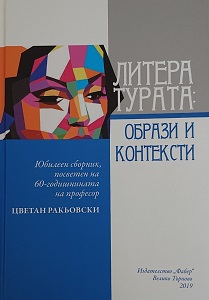Метаморфози по български: Към образната система на комедията "Големанов" от Ст. Л. Костов
Metamorphoses in Bulgarian – To the Characteristic System of the Golemanov Comedy by St. L. Kostov
Author(s): Vanja Dobreva
Subject(s): Language and Literature Studies, Studies of Literature, Bulgarian Literature, Philology
Published by: Софийски университет »Св. Климент Охридски«
Keywords: play, comedy; Balkan/Bulgarian; character; tradition; plot; actantial model
Summary/Abstract: In 1928 the ‘Golemanov’, just-written comedy in three acts by St. L. Kostov, had been played on the stage of the National Theatre. Its plot is based on a typical principle for the character comedy by which the decay of society is revealed, the typology of a character belonging to the bourgeois elite is realistically displayed, different points of view are refined in to fully depict the phenomenon of service. The character of Golemanov synthesizes the traditions and meanings that distinguish the Balkan cultural situation and embodies the typology of a Balkans character – the Power-hungry man. The playwright St. L. Kostov constructs an actantial model about the hero’s ambitions for power and control – with the opening and final moments in the comedy act. The individual characteristics of a completely negative character are developed for the first time in the Bulgarian comedy in Golemanov. This character lives in the Balkans and his behaviour is a result of geographical and historical circumstances, but he also appears – in the logic of comedic action – the personification of universal human defects. The combination of regional and universal determines the significant place of the ‘Golemanov’ comedy in the Bulgarian dramaturgy.
- Page Range: 170-182
- Page Count: 13
- Publication Year: 2019
- Language: Bulgarian
- Content File-PDF

